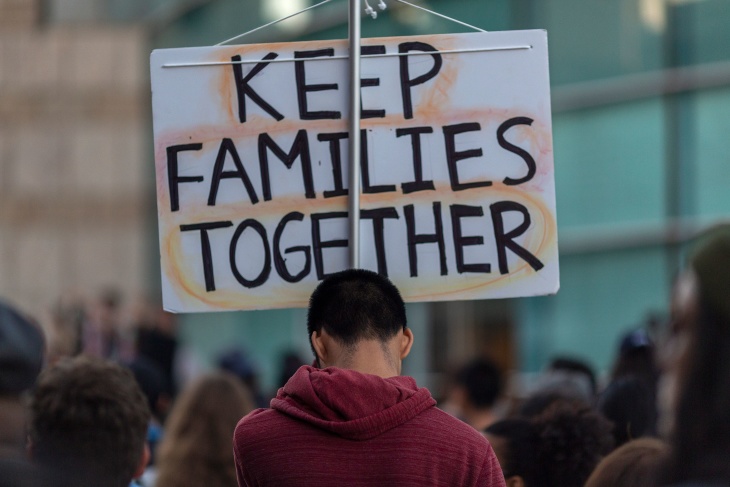
A June 2019 rally in Little Tokyo to oppose a Trump administration plan to use Fort Sill Army base in Oklahoma as a detention center for immigrant children and other immigrant detainees. (David McNew/AFP via Getty Images)
President-elect Joe Biden has promised to put the coronavirus health crisis and economic recovery at the forefront of his agenda once in office. But his administration is also expected to address immigration — and to use executive orders to reverse many of outgoing President Donald Trump’s most controversial immigration policies.
The Biden administration has plans to restore the Obama-era Deferred Action for Childhood Arrivals program, known as DACA, and discontinue the use of Pentagon funds to build a wall at the southern border.
But will he go beyond rolling back the Trump administration’s policies, and commit to bringing about comprehensive immigration reform legislation, as he’s promised to do? And would Congress support this kind of immigration agenda?
“Joe Biden has to keep his promise if he wants to avoid being in the shadow of Barack Obama — of being called deporter-in-chief. I believe he will keep that promise,” said Paola Ramos, a journalist, and author who is the former deputy director of Hispanic media for the 2016 Hillary Clinton campaign and a host for Vice News.
“It’s not only the politically right thing to do, or the moral right thing to do,” she said. “I think not doing anything can really cause Democrats a lot of harm in the long term.”
In a recent interview for Take Two’s immigration special, “The Invisible Wall,” host A Martinez spoke with Ramos and with Mike Madrid, a Sacramento-based Republican strategist and co-founder of the Lincoln Project, about what they think the political landscape looks like for immigration moving forward.
Here’s what they had to say. (Responses have been lightly edited for clarity.)
Given that the Biden-Harris team will need to put the pandemic and the economy at the forefront, what’s the argument for addressing immigration in the first 100 days? Why would it be important to do something? Or is it?
Paola Ramos: One of the critical reasons why Joe Biden will step into the White House in January is because of the way that immigrants and Latinos organized for him. For instance, we know that the reason why Maricopa County, Arizona flipped is because young Latinos organized for their parents — people that were deported under Joe Arpaio, people that were racially profiled under Joe Arpaio.
So it’s not only the politically right thing to do or the moral right thing to do. I think not doing anything can really cause Democrats a lot of harm in the long term. It can cause them the vote of confidence — a vote that if Joe Biden does not uphold his promise, as we saw with the Obama administration, can have pretty big and serious implications for Democrats in the long run.
(Note: Joe Arpaio is the former sheriff of Maricopa County, Arizona who became known for his hardline tactics against undocumented immigrants. He lost his bid during the Republican primary earlier this year for his old position as Maricopa County sheriff.)
Mike Madrid: There’s both a moral element to addressing immigration, along with a political one. This has been a fight deferred for too many decades. It’s long overdue. The system is broken. Up until this point, I believe both sides sought partisan advantage, frankly, by not fixing it. We have to remember that both George W. Bush, who I helped get elected, and Barack Obama essentially chose not to push this and spend the political capital to get this done.
I believe the dynamics are much different now in this environment. I think with a very thin majority, Nancy Pelosi can probably work to get the Democratic votes together and I think Kevin McCarthy actually has some incentive to get this deal done, as does Mitch McConnell, I think. I think it’s really going to take the leadership of Joe Biden at this point. But it depends on whether the Democratic Party has other priorities as they did in 2008 or if they finally want to get this deal done. I believe they can if they forced the issue.
(Note: Immigrant advocates criticized President Obama over his administration’s handling of deportations and his failure to fulfill a campaign promise for immigration reform, particularly after the 2008 election when both the House and Senate were Democratic. )
We know that immigrating to the U.S. has never been easy. Policy problems long predated Donald Trump, which is why many presidents have talked about the need for reform. What can you tell us about the persistent problems that have led many to believe that our immigration system is fundamentally broken?
Ramos: In every story where I’m covering Latinos or immigrants, they remind me that this isn’t Trump’s problem. The wall isn’t Trump’s problem. The system isn’t his. It’s been this way for decades at this point. Let’s remember that the Department of Homeland Security (DHS) was created [in 2002] and the very premise of it was the criminalization of others. Moreover, a couple of years ago it was the Obama administration who deported more than three million people. It was the Obama administration who built a lot of the detention facilities we have now.
I think one of the most important things the immigrant community is looking for is having a DHS secretary who understands that the system is fundamentally broken, that has an extensive background on immigration and that respects the United States’ humanitarian obligations. I think immigration advocates are looking to have the right person … that can recognize and say out loud that our immigration system is broken.
Madrid: Immigration reform is always very difficult to do, which is why it’s oftentimes a once in a generation event. We began this journey essentially with the 1965 INA (Immigration and Nationality Act). We didn’t get it done until 1986 with the Immigration Reform and Control Act, and we have not touched it since. It is politically fraught, but like I said, I do believe that the politics now allow for a win for both sides — if this is done right.
At the same time, I do believe Donald Trump and Trumpism is not going anywhere. I believe he will be catcalling from outside the system and probably threatening Republican members who dare to do the right thing to get this done. But I think that getting this done will actually help some Republican members. I think it will happen, but I may be pollyannish when it comes to this. I thought it would happen in 2000 and it didn’t. But again, I think the politics allow for it now. We saw a split vote in Arizona and the Rio Grande Valley, so because of the Latino diversification, I think both parties have an opportunity to get a real deal done.
We’ve been hearing from immigration attorneys and experts that many of President Trump’s policies can be reversed through executive order, but others might take more time. What would you say is the one policy Joe Biden needs to prioritize in his first 100 days?
Ramos: First of all, I’d say all of them, because a lot of them are really easy to roll back. A lot of the Trump agenda was based on executive orders, so doing rollbacks is something pretty simple Joe Biden can do. But if I had to focus on two, I would say he has to revive DACA. He has to reinstitute that. I also think he needs to restructure ICE’s enforcement priorities. He needs to ensure that we go back to Barack Obama’s enforcement priorities, which focused on going after folks with criminal records. I think that’s going to make a big difference. I think it’ll send the right message to the immigrant community.
Madrid: I genuinely think it’s a comprehensive problem at this point. There’s no tinkering around the edges. It has to be fixed from top to bottom, or you’re just kind of like putting Scotch tape around a plumbing problem under the sink. It may work for a little bit, but it’s ultimately going to burst out and I think that’s kind of where we’re at.
Mike, we’ve heard a lot about how the Trump administration took a protectionist attitude toward immigration. Do you think that is representative of a wider thinking among GOP members who are still in power in Congress ?
Madrid: I think that has become the dominant thought. When I was first working on this issue in the Bush administration in 2000, the pre 9/11 era, there was a very different school of thought with Republican leaders and frankly, even the rank-and-file voter has changed markedly. The party has become much more isolationist, much more protectionist and much more nativist. I think that is the dominant thought from top to bottom, from elected leadership down to the voter base. So there’s not a whole lot of voices like mine in the party anymore. I’m kind of a quasi-Republican at this point. But I also don’t believe I’m alone.
Paola, as a Democratic strategist, what do you think Joe Biden’s biggest challenge will be and how important are those Senate seats in Georgia to getting a consensus on immigration policies?
Ramos: Joe Biden has to keep his promise if he wants to avoid being in the shadow of Barack Obama — of being called deporter in chief. I believe he will keep that promise. I think that the role of Kamala Harris will be fundamental and important. Let’s not forget that the very first bill that she introduced was one focused on immigration. It was about giving immigrants access to counsel as they cross the border.
Even if Democrats lose Georgia, if Biden does what he does best, which is be an incredible negotiator, he can get immigration reform done. It will take prioritizing the issue and keeping his promise. I feel pretty confident because I think they know what the stakes are if they don’t.
Can the U.S. reconcile its relationship with the immigrant community both here and abroad?
Madrid: I don’t know that it can be reconciled, but it can write a new history going forward. This country, whether right or wrong, has a long history of doing that. I’m not sure that you’re ever going to get a nativist population … at least half of us —[to] go through a reconciliation process, but we can start something new going forward.
Ramos: I think communities are traumatized. Pain has been done. They feel betrayed. But I think Joe Biden did a very important thing during one of the debates, which is that he apologized and he’s centered immigration in the first 100 days, so I do feel optimistic that some of the damage can be undone.
Our news is free on LAist. To make sure you get our coverage: Sign up for our daily newsletters. To support our non-profit public service journalism: Donate Now.
[Disclaimer]







